The last few months have been a testing time for the entire world. While 2020 started with a bang, the new decade rapidly changed direction when COVID-19 became a pandemic.
With people confined to their homes, our priorities and daily routines quickly changed. Forget going on holiday, wandering around a mall, or going to the cinema, in a matter of days, the only outing many of us were having was to the supermarket.
Although life across the globe became almost unrecognizable, the upheaval saw plenty of opportunities emerge. New initiatives and ways of working were established overnight. Some businesses pivoted with breakneck speed, while others prioritized delivery or curbside pickup. Some entrepreneurs, like Australians Lachlan Delchau-Jones and Taylor Reilly, took a chance to launch brand new businesses.
Post Contents
- Meet Lachlan and Taylor
- Coronavirus Lockdown Presents an Opportunity
- Launching During a Holiday to Immediate Success
- Unbelievable Returns on Ad Spend
- A Call From Mom Leads to a Profitable Pivot
- Altering Audience Targeting Ensures More Success
- Scaling Fast And Encountering Problems Faster
- Breaking the Rules in Unprecedented Times
- Scaling to $70k and Trying to Take Things International
- Ending the Experiment and Looking to the Future
- Want to Learn More?

Don’t wait for someone else to do it. Hire yourself and start calling the shots.
Get Started FreeMeet Lachlan and Taylor
At just 18 and 19 years old, you could be forgiven for thinking their lockdown ecommerce store was a first for Lachlan and Taylor. But despite their young age, the pair have been hustling for years.
From Queensland, Australia, these two teen entrepreneurs talked to me through their ecommerce journey to their current store, which managed to generate $70,000 in sales in just one month.
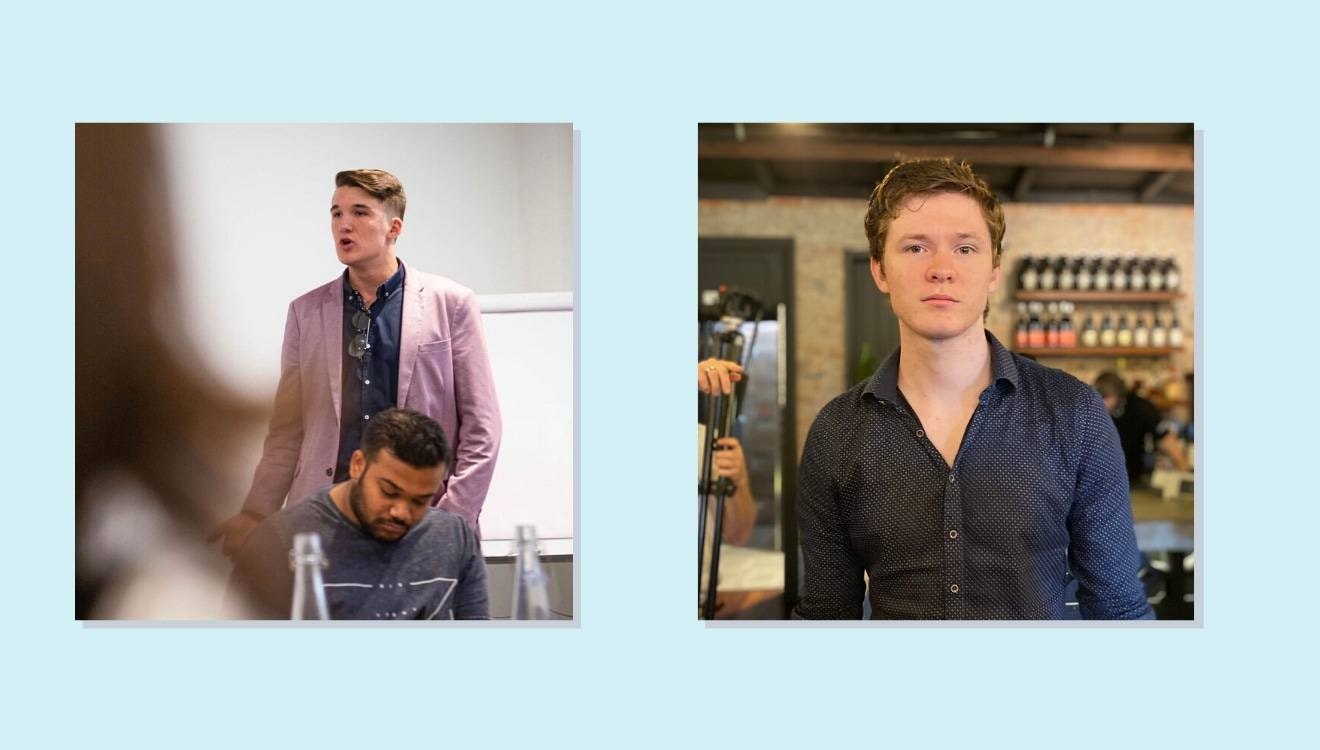
“I graduated school last year,” says Lachlan, who turned 18 in January. ”Dropshipping was the first step, and that was back when I was 14. The sole focus and the reason behind starting dropshipping then was just to get something going for myself. I wanted to have something that I could call mine.”
Starting at such a young age, Lachlan worked shifts at McDonald’s to fund his first forays into ecommerce. But as with many first time ventures, the money quickly disappeared.
“I basically had a lot of failures in the beginning. I lost $2000, pretty much in just trial-and-error, testing Facebook advertising. First time.”
Despite this, he knew that Facebook ads were something he should learn in its entirety, and these days he’s thankful for the lessons those losses taught him.
“I wouldn’t be in the position I am today if it wasn’t for that. I learned so much from it, not even just the information, I learned that the only way I can lose money through advertising is by not learning from my ads.”
While Lachlan was learning the ins and outs of ecommerce, Taylor was more focused on digital marketing. By doing everything from building websites to managing social media accounts, he’d built up an arsenal of skills by the time he got into dropshipping at the start of 2019.
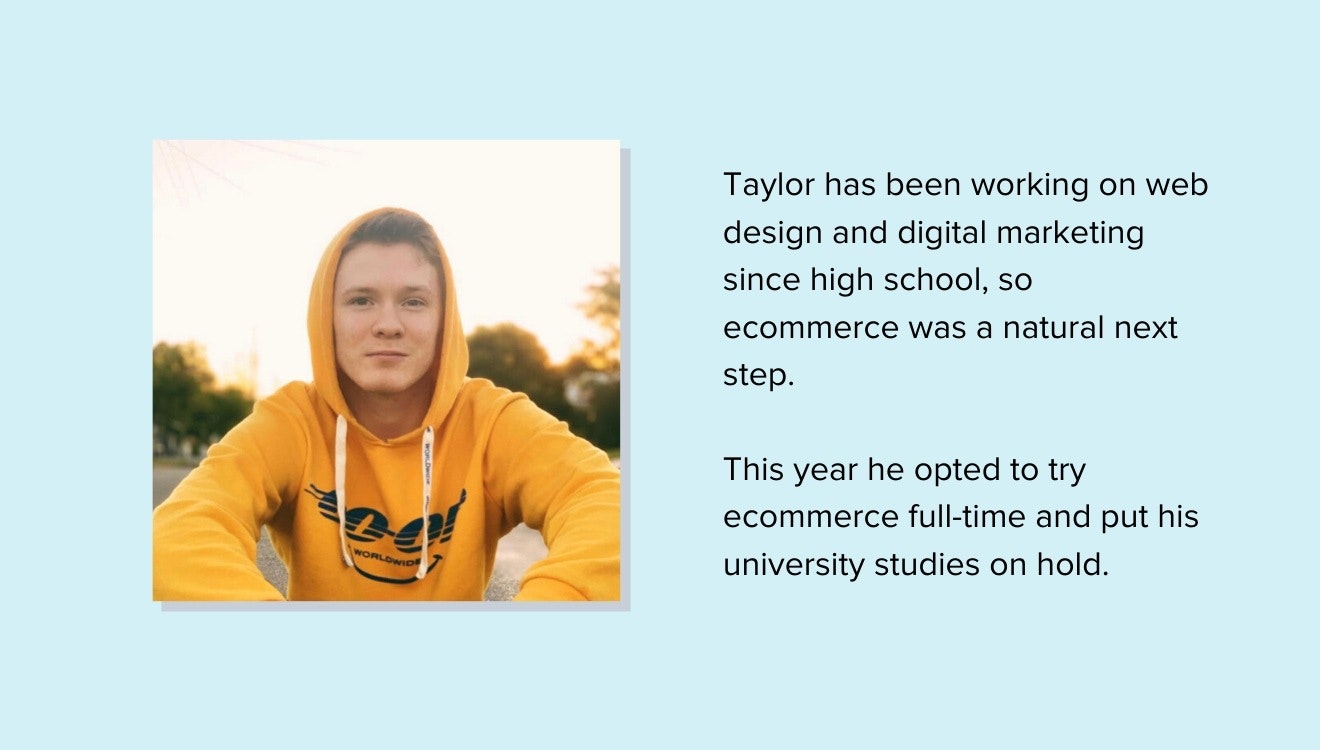
By then, many people claimed dropshipping was dead, but Taylor knew some were making the business model work for them. He just needed to figure out how he could do the same.
For the next year, he worked on dropshipping projects while in his second year of university and had varying levels of success. By the time the coronavirus pandemic kicked up a notch in 2020, he felt sure enough to put his studies on hold and jump into ecommerce full time.
“When I saw the coronavirus stuff happening, I literally said to Lachie, ‘Yeah, I’m not going back this semester. We’re going full-in right now.’ And that’s what we did. I knew when the coronavirus hit, there was going to be a lot of opportunity coming, and we were trying to pick where it’s going to be.”
After watching how things unfolded during February and March, Lachlan and Taylor could see things were rapidly changing. City after city in the Northern hemisphere were declaring lockdowns, and it seemed like Australia would soon follow suit.
Initially, the pair weren’t sure what to expect – they even wondered whether consumer spending would dry up. However, after a trip to shops on Good Friday, Lachlan could see that people were still spending. And after seeing how much people were buying, inspiration struck, and he immediately rang Taylor.
“Lachie calls me at 10:00 pm and was like, “Alright, we’re going to do a store for this product. We’re going to see how it goes. I reckon it’s going to go good.”
“We were up all night on Friday night,” Lachlan adds.
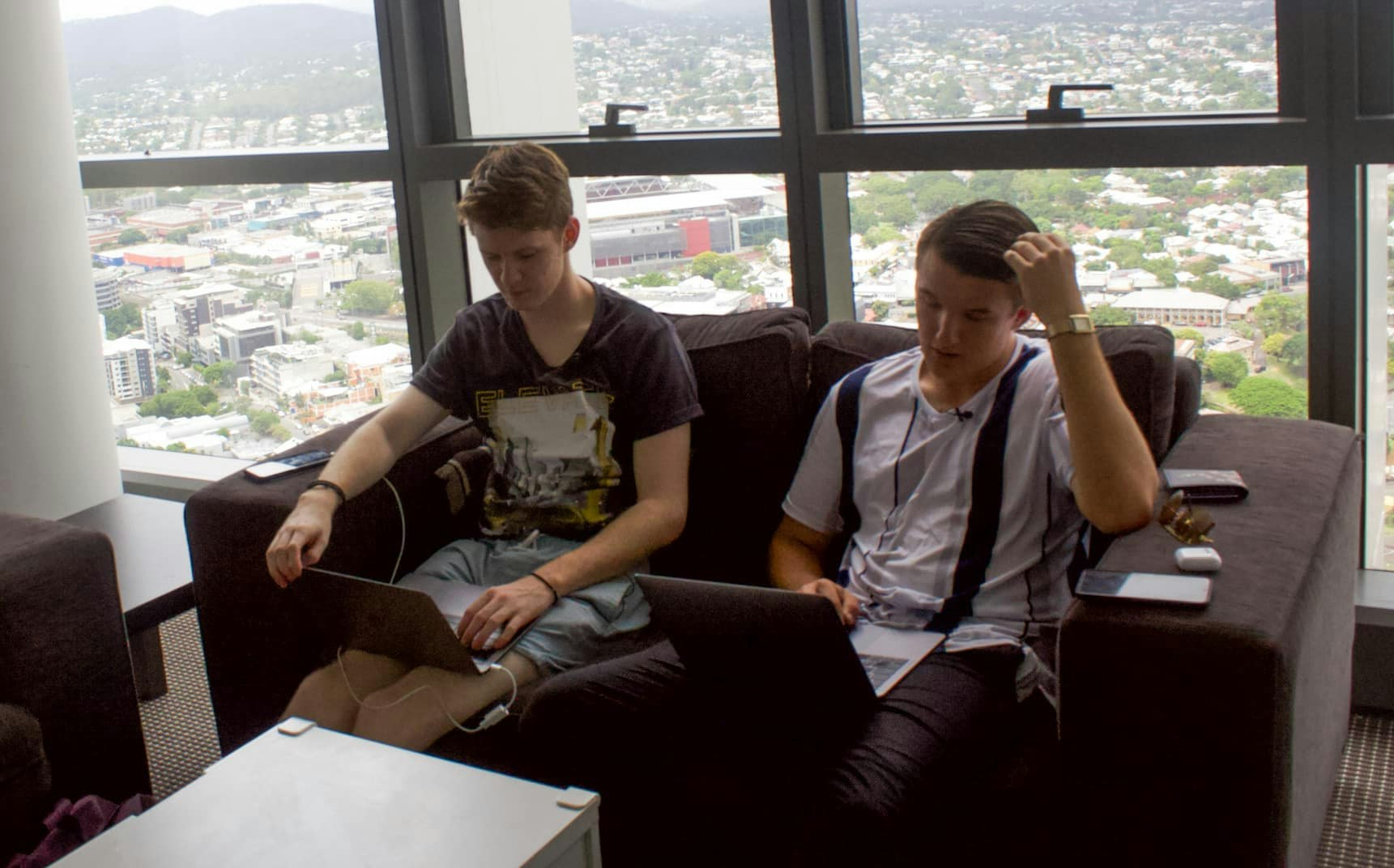
While some people tried to make a buck selling sanitizer or masks during coronavirus, Lachlan and Taylor didn’t want to sell something that could quickly turn unethical. After realizing consumer spending hadn’t slowed, they knew there would be other products that people would want to buy while isolating.
Lachlan had faith that a niche within the Toys & Hobbies category would be their winner. Their products were easy to source and would have good profit margins. They were also items having an unprecedented rise in demand due to people’s spending so much time indoors.
While the pair had had varying success over the years, one thing that had improved was their store building skills. After working through the night, the two had found a reputable supplier, created a presentable website with a handful of products and variants, and opened a Facebook Ads account.
Just hours after the initial idea, Taylor and Lachlan were ready to start selling.
Launching During a Holiday to Immediate Success
With everything in place, the pair felt good about their store and decided to start Facebook ads. They chose to stick with the market they knew best and focussed on an Australian audience. And knowing their product didn’t need a video to hook buyers, they opted for a carousel image ad format.
With all of that in place – and knowing they had a good product – they set a lofty goal of trying to make $500 on their very first day. They knew it would be tough, especially with absolutely no data on their Facebook Pixel, but they were confident in their store and ready to give it a shot.
They made $1400.
Shocked by the immediate success, they figured they would slowly scale things up. Taylor remembers that they were aiming for the $2000 mark.
“And then the next day was, yeah, let’s try and get it to maybe $2000 – 2k would be amazing. If we do another one and a half [of today’s sales], our life is going to be great.”
But once again, the store performed more than the two could have imagined.
“We did four grand.”
But it wasn’t a once-off. The store managed to hit $4,000 in daily sales for four days straight.
Unbelievable Returns on Ad Spend
Recalling the store’s initial success, it’s clear Lachlan is still in shock. And he’s the first to admit that it likely came down to a perfect storm.
“It’s just one of those things. This is with a fresh pixel, fresh Ads Manager, fresh store, fresh everything. This time last year, [nothing like this] could happen. But this year, everyone’s indoors. Bottom line, people are going to be at home on their device, on [social media]. It just literally – if the dots didn’t add up… But they all connected. It worked.”
It’s also likely the store’s ads performed so well because other advertisers have been cutting back on ads in a big way.
While Facebook hasn’t given any specific numbers, back in March, it noted “a weakening in our ads business in countries taking aggressive actions to reduce the spread of COVID-19.” And in late April, the company warned investors of “a significant reduction in the demand for advertising” in their Q1 earnings report.
So, when Facebook was hemorrhaging advertisers, Lachlan and Taylor’s store may have been rewarded for running ads. Looking at the store’s Ads Manager, in its first full week, it had an average return on ad spend (ROAS) of 9.85. That’s a ROAS three or four times higher than their usual benchmark for success.
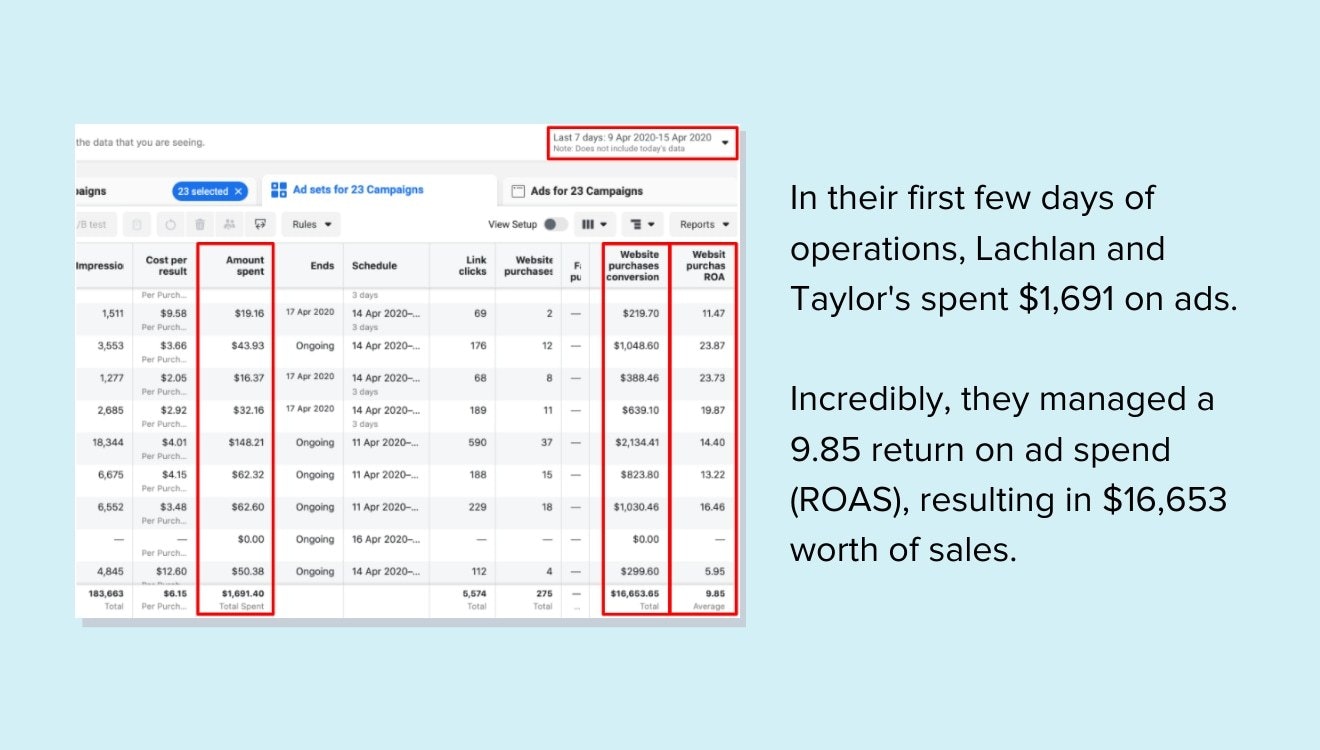
Considering Lachlan and Taylor built their store to take advantage of lifestyle changes due to the pandemic, they were already in an excellent position to make sales. However, there was also something else that first weekend of operations that helped propel their store.
A Call From Mom Leads to a Profitable Pivot
By focussing on the local Australian market, the pair had home advantage in finding opportunities that could help them grow. And it was a phone call from Lachlan’s mom that helped them set up one of their most successful campaigns.
After spending the first weekend of the store working on ads, an opportunity presenting itself that almost seemed too good to be true.
“Lachie gives me a call at like 8:00 pm, and he goes, ‘My mum’s just called me, and she said there’s going to be a Channel 9 story on this product.’ So what we did was we pivoted straight away and created a whole new campaign targeting Channel 9 News.”
Targeting Channel 9 viewers meant that as soon as the show went to ads and people picked up their phones, they saw advertisements for the product they’d just seen on the news story. The results were immediate. The pair could pinpoint exactly when the network was going to an ad break by the store’s uptick in traffic alone.
“We had [Shopify] live view up. We’re just going, ‘Yep, ad break,’ says Taylor. “By 5:00 or 6:00 pm, we’d only done $500 that day, which is what we were shooting for. By 10:00 pm we’d done $1,500.”
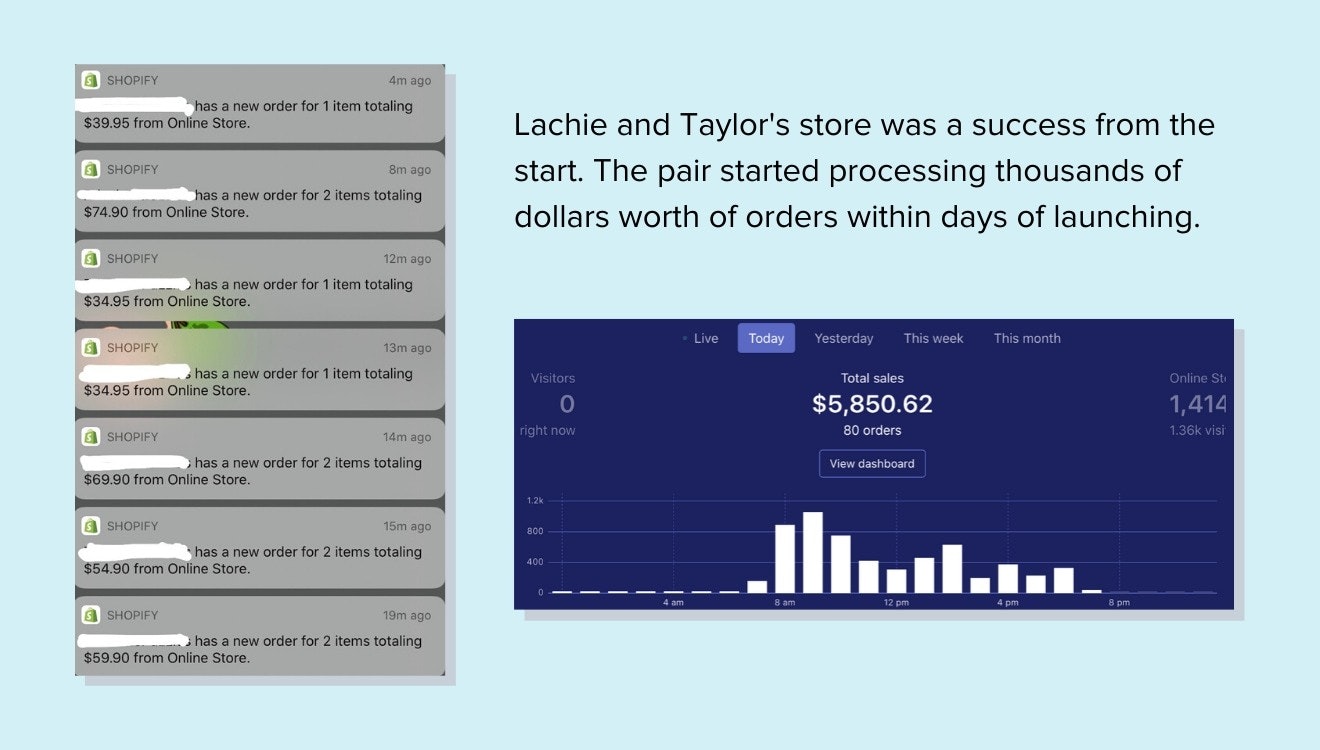
Altering Audience Targeting Ensures More Success
Reaching so many people so early on also helped confirm who the store’s primary audience was. Although the pair had put a lot of work into defining their audience, the big rush from the Channel 9 viewer pivot helped them figure out they had been slightly off the mark.
“Our original thought going into it was that it was parents buying it for their families,” says Taylor. “And then we found out it wasn’t even the people we originally thought who were buying. It was grandparents just buying it for themselves because they’re bored.”
Having these moments of realizations early on helped set Lachlan and Taylor up for continued success as the weeks went on. They then adjusted their ads, targeting an older audience for the remainder of their store’s lifespan.
But scaling this fast wasn’t without its challenges, and the two spent hours ensuring they could keep their store online and running.
Scaling Fast And Encountering Problems Faster
Almost immediately after opening, Lachlan and Taylor had to become problem solvers if they wanted to make this store work.
It started with cash flow issues. Lachlan and Taylor’s first cash payout from Shopify was delayed by four or five days due to Australia having two public holidays over Easter weekend. And, soon enough, PayPal put a hold on their cash as well.
With all of their sales money tied up – and neither of the pair having a credit card – it forced them to use almost $1200 of their savings to fulfill the first few days of orders.
“We had no cash flow going in – and we were scaling it quickly.”
With PayPal holding around $8,000 worth of sales revenue, the two decided to remove it as a payment gateway in their store. Instead, they relied on Shopify payments, which they knew would payout regularly. They’ve continued to add tracking numbers to PayPal transactions and keep customers up to date, but know they probably won’t get access to the cash until after items are confirmed as delivered.
“We’re just treating it now as PayPal is the profit,” says Lachlan. “We know that’s profit at the end of all this.”
They also encountered issues with Facebook ads. Under normal circumstances, it takes time before a new Pixel has enough data for lookalike audiences. Lachlan and Taylor’s store had enough data in just one week. Despite all the action on their Pixel, Facebook still saw the store as new and placed spending restrictions on their account.
“We’ve run into Facebook billing limits,” says Taylor. “I remember on our third day, Facebook said, “Oh, you can’t spend any more money, you’re too new to Facebook.”
The pair spent hours talking with Facebook representatives over chat to prove the store wasn’t fraudulent.
“Live chats, reviews, everything. We were sitting there with the tab open,” Lachlan says.
Thankfully their Facebook issues didn’t last long, and the pair even admit the social media giant was good to work with.
With their money and ads problems somewhat fixed, the pair focused on maintaining excellent customer service, which is not always easy when you’re scaling quickly. But, thinking fast, they came up with a genius strategy for their customer service. You can learn all about this and more in our Start Yours podcast episode with the pair. Listen at the top of this article, over here, or wherever you usually get your podcasts.
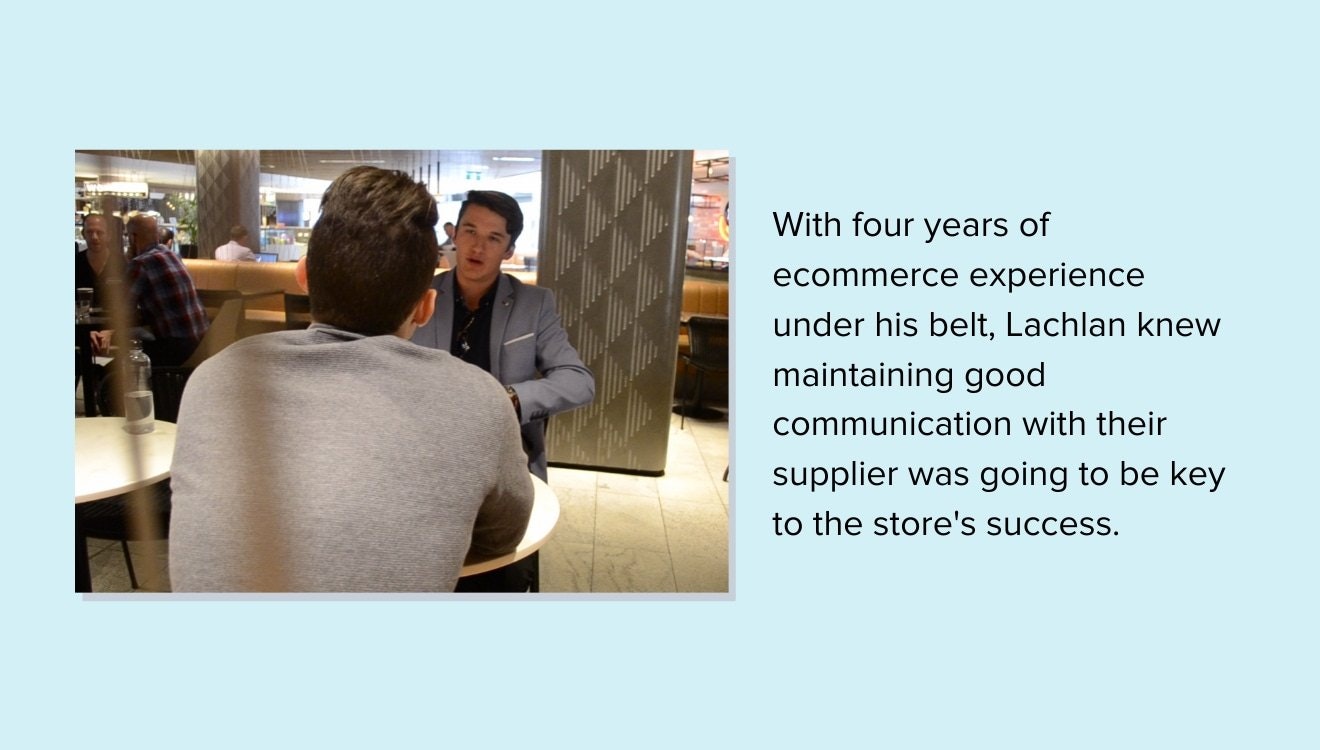
Something else the pair had worked fast to establish was a close working relationship with their supplier. Lachlan worked with with the supplier to make sure their orders had priority and were shipped as soon as possible.
“I have been in very close contact with him, and we’ve organized an agreement, and we’re taking priority. And he knows how many orders we’re getting per variant per day and he’s getting those shipped in as well with a deposit. So we’re working directly with him.”
Ideally, the pair would have worked with an agent to make the process as smooth as possible. However, the fast-paced nature of this store meant there was little time for delay. In reality, the entire store has gone against how Lachlan and Taylor usually operate.
Breaking the Rules in Unprecedented Times
There’s one thing that serial entrepreneurs have in common: they all establish systems and rules for starting and running businesses. This includes things like deciding which type of store to run or creating a strictly controlled process for identifying winning products.
Taking a systematic approach like this means that success can (hopefully) be replicated. Other dropshippers such as Shishir and Namrata Nigam are big believers that the most important thing you can do to guarantee sustainable success is to develop systems.
Lachlan and Taylor also have rules for their businesses – it’s part of the reason they work so well together. But in the case of this store, they tore their rulebook up knowing this was a unique opportunity.
“Lachie and I have a product checklist that we normally go through, and one of those is, ‘You can’t go down to your local shopping center and buy it,’” says Taylor. “That’s one of the biggest factors – it needs to be a novelty. So [this store] breaks all the rules, which is shocking for us.”
“We haven’t followed traditional dropshipping plans and what we traditionally do,” Lachlan confirms. “We haven’t – you can’t. We’re going against all of the traditional dropshipping plans and how we kind of go about the business model. We don’t build niche stores, but strictly one-product stores.”
With the pair knowing they had limited time to sell in their niche (“we knew this product doesn’t sell outside of COVID”), they stripped away the time-consuming parts of their normal processes. Instead, they used the skills they’d developed over the last few years to guide them. All of that, combined with continually adjusting campaigns and audiences, helped make this deviation from their rules a success.
The results of this experimental store have shown the pair that while rules and systems are essential to have, occasionally, there are opportunities that go counter to all of that. Although they may be few and far between, keeping an eye out for these exceptional circumstances and knowing when to go all-in can be immensely rewarding.
Scaling to $70k and Trying to Take Things International
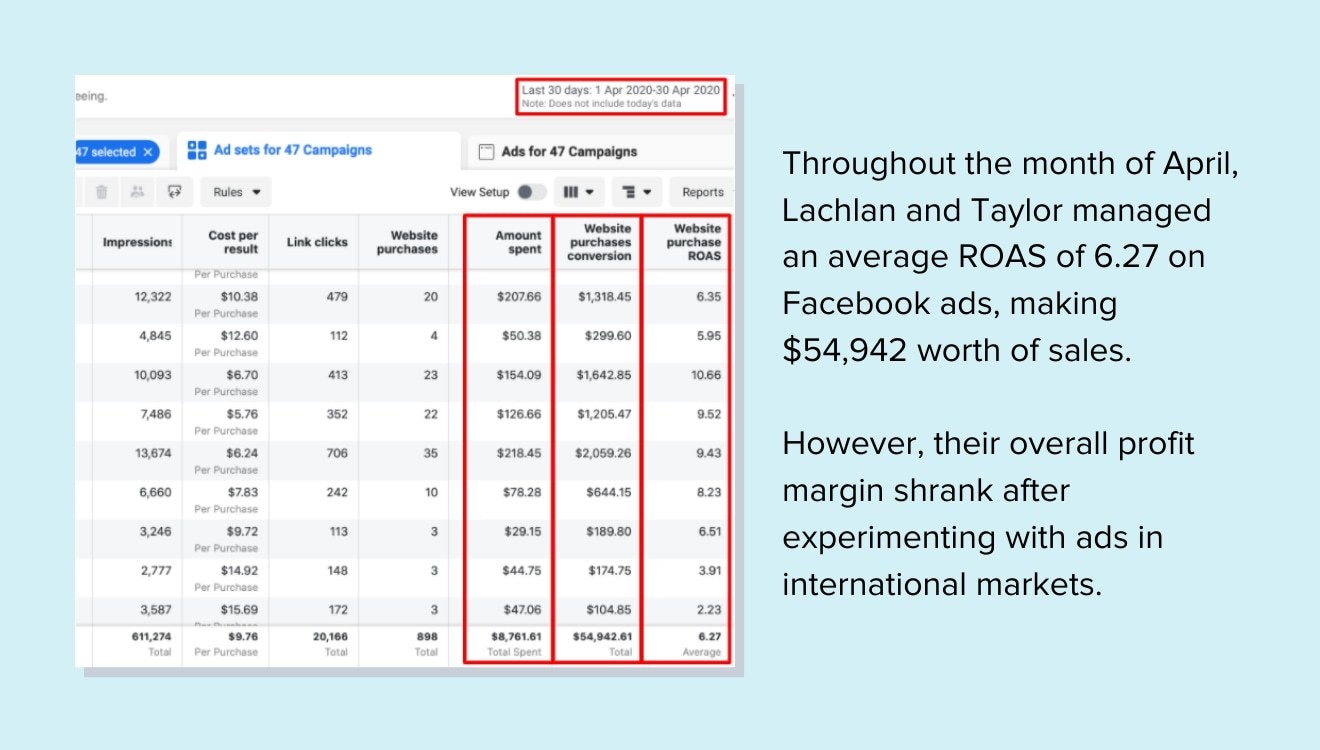
After overcoming all the bumps and hurdles put in their way, Lachlan and Taylor continued to sell hard in the Australian market. The demand for their products was still strong, but it was clear the market was waning.
With sales hitting $61,000 after only 20 days of operation, the pair set their sights on expanding to other markets. They started experimenting with ads in other English-speaking countries to see what would come of them.
Unfortunately, it didn’t take off as it had in Australia.
Due to ad experimentation, Lachlan and Taylor’s profit margin was reducing – though, impressively, it still ended up around 28 percent – and they realized that expansion was probably not going to work. Lockdowns were relaxing all over the world, people were starting to experience more economic hardship, and their products weren’t as enticing as they had been during April.
Ending the Experiment and Looking to the Future
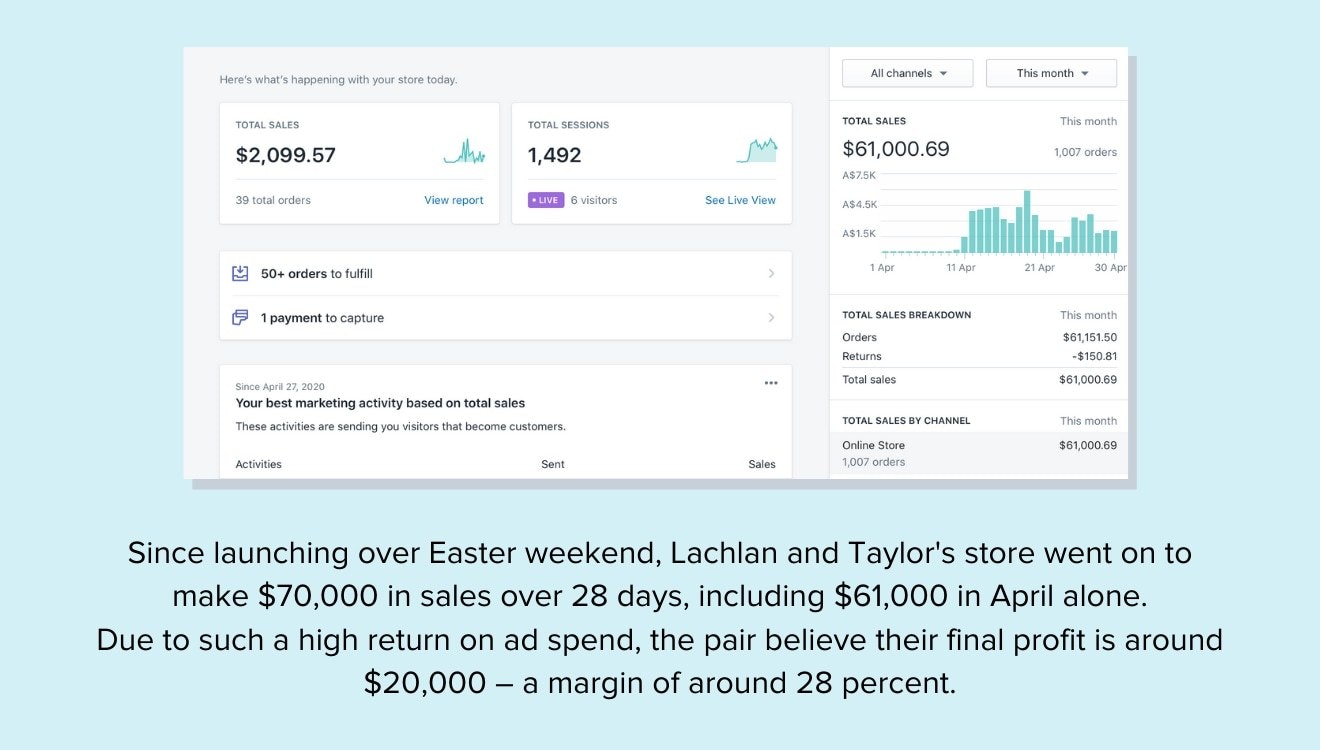
While it could have been disappointing to some, Lachlan and Taylor were always realistic about the store’s lifespan. And more than anything, they were curious how long the boom would last before the inevitable bust.
After four weeks of operation, their coronavirus experiment had run its course. As of late May, the store is still live but not actively selling any products. Their full focus is now on ensuring all customers receive their orders. No easy feat when global air traffic has slowed to a trickle.
Overall the pair did $70,000 in sales and managed to walk away with $20,000 in profit – a 28 percent profit margin from 28 days of hard work.
With all the success of their store, you might expect that Lachlan and Taylor feel pretty smug about their experiment. The reality couldn’t be farther from the truth. They’re happy, of course, but as with most entrepreneurs, they can’t help but think about everything they could have done.
“Lachie and I were talking about it the other day,” says Taylor. “We’re not really satisfied with it – we know we can do better.”
And although they’re still tying up loose ends from this experimental store, the pair have set their sights on another big challenge for 2021.
“The biggest thing Lachie and I want to do this year is working with influencers.”
With a recession looming, the two want help influencers who might get dropped by sponsors or partnerships to build a brand for themselves. Having gained marketing and business know-how through ecommerce, they now have a skill set they can draw on for a brand new venture.
“Dropshipping is the entry point for a lot of people to business, ecommerce, and entrepreneurship,” says Lachlan.
“It is the perfect first business,” adds Taylor. “But it’s a stepping stone.”
“You have to see more opportunities.”

